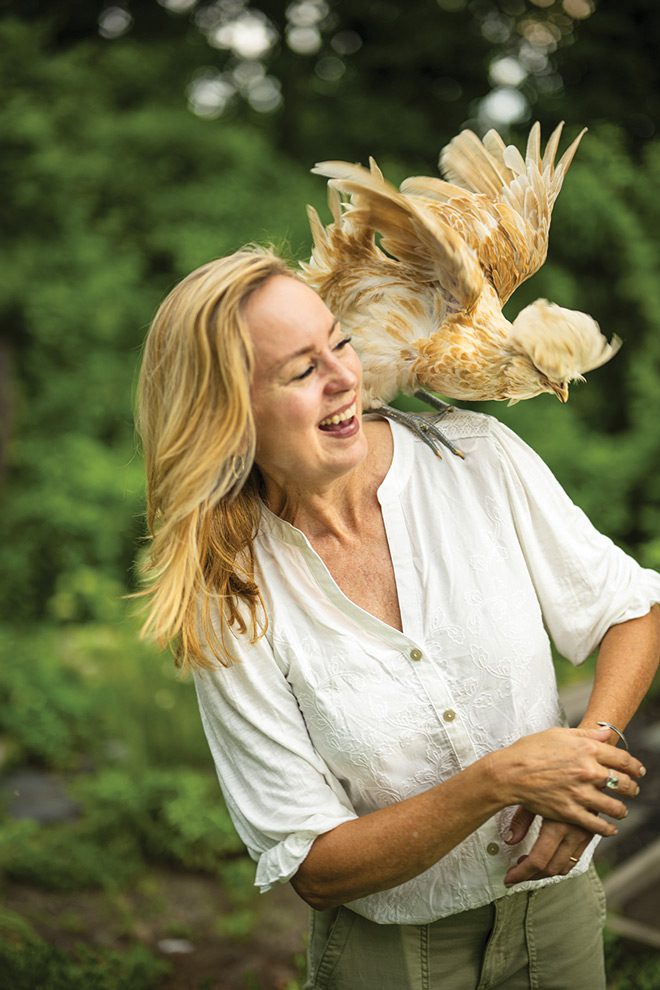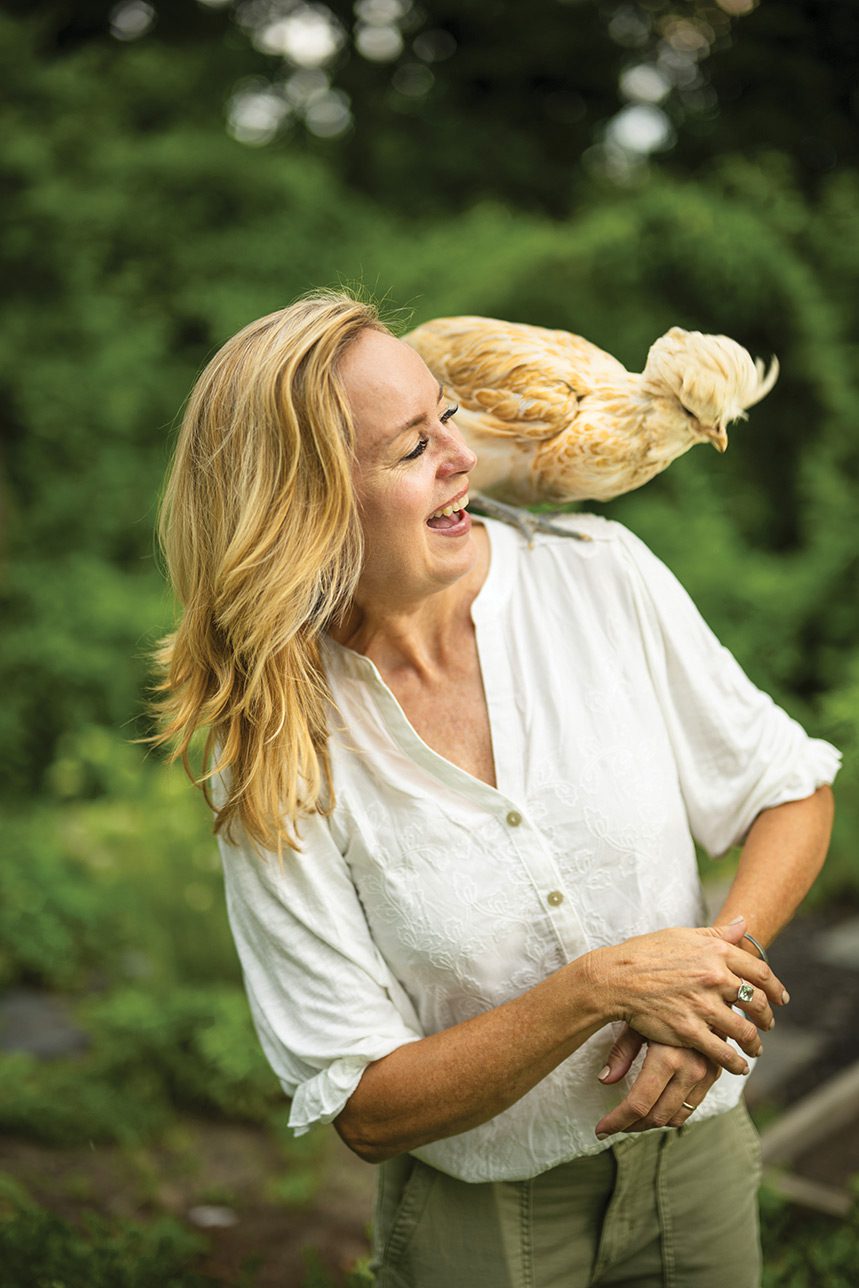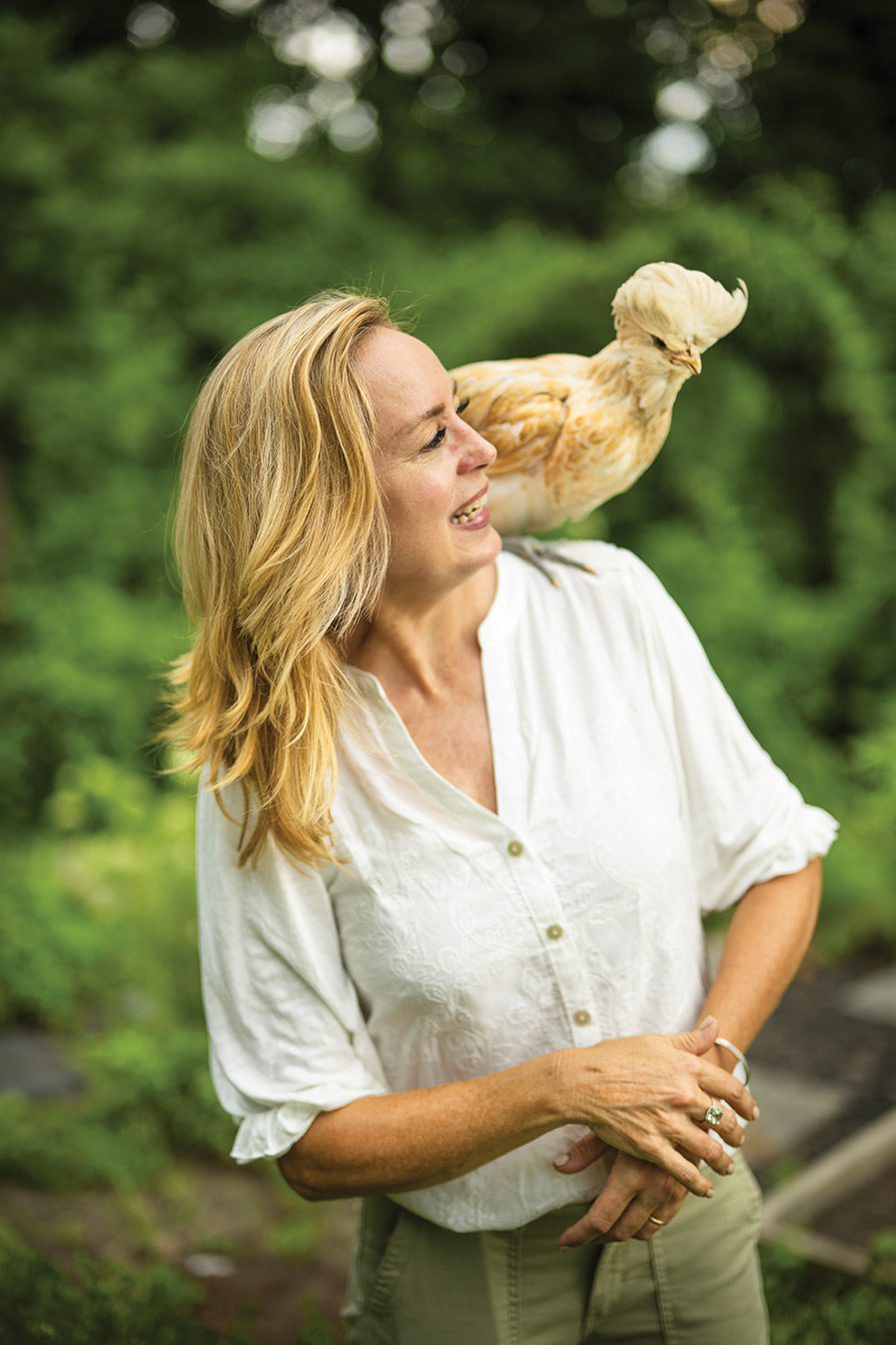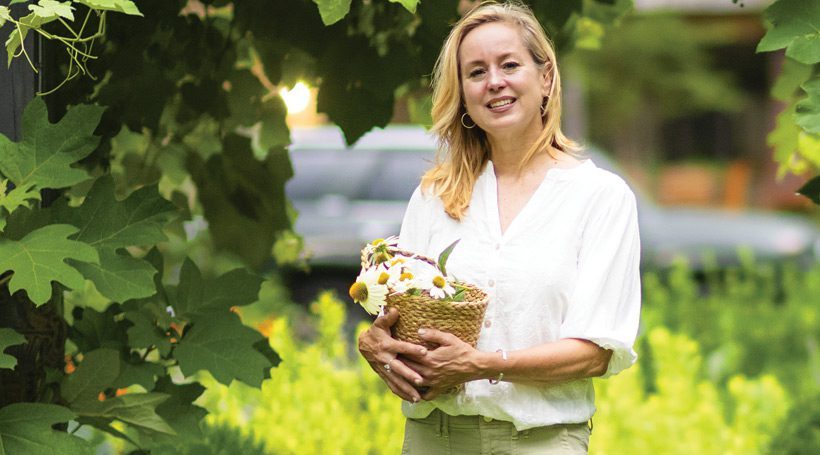Photography David Michael Howarth
 With over 150,000 followers on Instagram, a gardening Facebook series with SJ Mag Media and a regular spot on FOX 29, Toni Farmer is teaching the world how to garden. Not for fun (well, maybe a little) but because she truly believes our food system is in crisis. So the day might come, she will tell you, when your best, most reliable source for healthy food will be your backyard and, if she has her way, your community.
With over 150,000 followers on Instagram, a gardening Facebook series with SJ Mag Media and a regular spot on FOX 29, Toni Farmer is teaching the world how to garden. Not for fun (well, maybe a little) but because she truly believes our food system is in crisis. So the day might come, she will tell you, when your best, most reliable source for healthy food will be your backyard and, if she has her way, your community.
 A garden can be an unpredictable thing. One plant gives a bumper crop of tomatoes, while the plant next to it withers and wilts. One year the growing season stretches out to Halloween; the next, an early frost cuts things short. Bugs descend. Fungus appears. No matter how long you’ve been at it, no one season in the garden is like any before it.
A garden can be an unpredictable thing. One plant gives a bumper crop of tomatoes, while the plant next to it withers and wilts. One year the growing season stretches out to Halloween; the next, an early frost cuts things short. Bugs descend. Fungus appears. No matter how long you’ve been at it, no one season in the garden is like any before it.
But for a long time, while the rest of Toni Farmer’s life was unsettled and uncertain, the garden was a source of constant comfort.
“We moved every two years when I was a kid,” Farmer says. As her father climbed the career ladder, new jobs often took him to new states. “He’d literally go wherever the job was, call my mother and be like, ‘sell the house, bring the kids.’ My sister and I got ripped out of our community, away from our friends and everything else. I’ve lived in Tennessee, Pennsylvania, Wisconsin, Florida, Connecticut. But the beautiful thing – the only consistent thing, was that my mother is a brilliant gardener. She gardened everywhere we went.”
All that experience as the “new kid” made Farmer fearless. It’s a trait that serves her now as she becomes more and more well-known – globally known, actually – as a gardening educator and influencer. She teaches environmental science at her alma mater, the University of Pennsylvania. She co-hosts “The Goal is to Become a Gardener” with Marianne Aleardi – SJ Mag Media’s Facebook series that has nearly 100,000 views per episode. And Farmer also appears on “Tuesdays with Toni,” a weekly program on FOX 29’s streaming platform. Most notably though, she’s quickly becoming a familiar face on many Instagram feeds with over 150,000 followers and counting. On Instagram and Facebook, she posts miniature lectures on everything from pest control to politics.
 “Before the pandemic, I was not on social media at all,” Farmer says. “I hated it. I wanted no part of it. And then Covid hit and it was a trifecta. People were leaning into the wellness movement, they were trapped at home with nothing else to do, and it was springtime. My phone started ringing off the hook.” Overwhelmed with requests for gardening advice, Farmer decided to make videos for social media. It blew up right away, she says.
“Before the pandemic, I was not on social media at all,” Farmer says. “I hated it. I wanted no part of it. And then Covid hit and it was a trifecta. People were leaning into the wellness movement, they were trapped at home with nothing else to do, and it was springtime. My phone started ringing off the hook.” Overwhelmed with requests for gardening advice, Farmer decided to make videos for social media. It blew up right away, she says.
Some of the videos are filmed in Farmer’s university classroom in front of a whiteboard. Others are shot in the garden behind her mid-1700s home on Main Street in Moorestown – a garden that Farmer designed and built herself. A video tour of that garden went viral. So did a video on how to control mosquitos and videos explaining the negative impact of tariffs and other policies on farmers.
While Farmer does get the occasional troll in her comments, she says her devoted audience is quick to shut them down.
“I love them,” she says, “and I feel very protective of them. I spend hours every day answering questions – time that I probably don’t have – but they’re just so earnest. They’re like, you know, my zucchini keep falling off. What can I do? And I can’t not answer. I have to answer.”
Farmer’s online personality is unapologetically genuine. She talks about exactly what she wants to talk about. And what she’s most eager to cover is how we got cut off from our food system, and how we can renew the connection.
“We’ve gotten very busy,” she says. “We’ve gotten very distracted, and it’s all done for us. As a human being, when you’re very busy and someone has eliminated something you need to think about, you’re just grateful. The whole food system chain has eliminated our need to pay attention to it.”
It wasn’t always that way, she adds. “Prior to World War II, we grew 40% of our food in our backyards. If you needed cheese or meat, you bought it from a farm or a cheese monger or a butcher on your main street.”
“The whole food system chain has eliminated our need to pay attention to it.”
After the war, there was a baby boom and a period of massive economic growth. Suddenly, “it was a sign of success if you didn’t need to have a backyard chicken coop, and you didn’t have to grow your own food,” Farmer says. “You had arrived if you could go buy everything.”
In the same era, women entered the workforce en masse, which Farmer calls a wonderful thing, but a terrible thing for food.
“Women stopped cooking and they needed convenience. Foods for the microwave and foods that need preservatives and chemicals to stay fresh. Within one generation, we lost our connection to our food system.”
 But slowly and steadily, Farmer says, that connection is being rebuilt. And leading the charge are millennials who make up a large portion of her online following. “They are in love with this stuff,” she says. “And that’s wonderful, because it means we’re coming back to it not out of desperation, but out of joy and concern for our health and wellness.”
But slowly and steadily, Farmer says, that connection is being rebuilt. And leading the charge are millennials who make up a large portion of her online following. “They are in love with this stuff,” she says. “And that’s wonderful, because it means we’re coming back to it not out of desperation, but out of joy and concern for our health and wellness.”
The timing couldn’t be better, she adds. “When we get to a point where we cannot get blueberries in the store any longer, there’ll be a whole generation of people who go, ‘You know, I’ll just buy some blueberry bushes.’”
And make no mistake, Farmer believes that point is coming. Soil degradation, pesticide and herbicide overuse and the effects of climate change are drastically affecting global agriculture.
“I feel like I’m the scariest nice person ever,” she says. “I’m really kind and optimistic and joyful, and I have to lecture all the time to scare the living daylights out of my students, my garden club people, my Instagram following. Our food system is in complete crisis: We’re going to run out of food.”
That won’t happen though – at least not in South Jersey – if Farmer gets her way. She wants to help everyone who wants to have a garden get started, so her content is loaded with beginner-friendly tutorials. But she also doesn’t think people should be growing vegetables, fruit and herbs just to fill their own table.
“I would say my main goal is food security and community,” she says. “The only way I feel we get through this is together. In times of crisis, people tend to hole up and develop a scarcity mentality: ‘I’m going to stock up. I’m going to hide my stuff. I’m going to grow a garden and not tell anybody, because this is for my family, and I need to protect my family.’ We will all suffer if that’s the approach we take.”
In some places, Farmer says, suffering’s already begun. “The idea that 6 miles from me in Camden there are kids without enough to eat just claws at my soul,” she says. “We can grow food everywhere – empty lots, strips of grass between the street and yard – we can grow so much food, and then we can share it.”
Farmer has begun working with schools, churches and other organizations to get gardens up and running. “The gardens supply the cafeteria at the school or go to food pantries, because those places don’t tend to get fresh produce,” she says. Before Farmer gets started, an organization has to meet certain criteria, including having a team of dedicated volunteers in place.
“After a year, the group at Presbyterian Church here in Moorestown became fully self-sufficient,” she says. “Now they’re delivering 600 pounds of produce to the local food pantry every summer, and this is an eighth of an acre they’re using. Imagine how we could change the world if every school and every church and every synagogue committed to an eighth of an acre and 10 people.”
Veteran gardeners and rookie growers alike are connecting with Farmer’s work online, and she’s showing no signs of slowing. The more people she can teach, Farmer believes, the better chance we have to rescue our local communities and, ultimately, the planet.
“They’re learning about insects. They’re learning about birds. They’re learning about why you shouldn’t spray your backyard to kill all the mosquitoes. They’re learning about why to put a water fountain back there, and that being in the garden can really improve mental health for everyone,” she says.
“Getting reconnected with your children, with your backyard and with your ecosystem is a beautiful thing that is coming out of this. I think it will benefit us for a long, long time.”
















